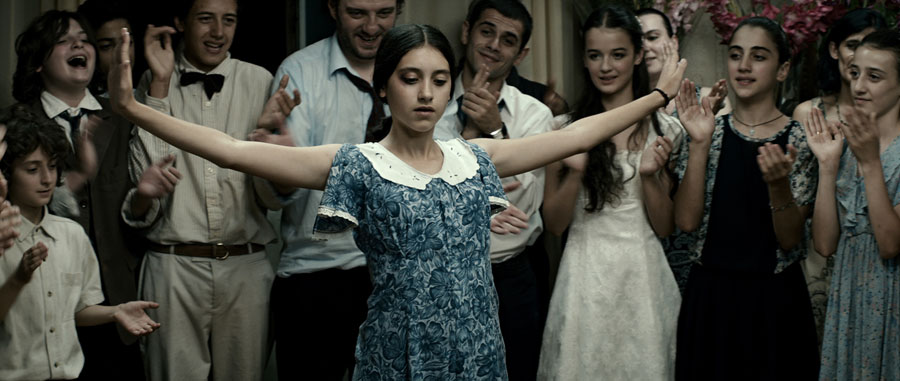Flowers of Sameness
In Bloom
directed by Nana Ekvtimishvili and Simon Gross
Big World Pictures
Opens in Los Angeles on February 7
Georgia,1992. Civil War has been raging for four years. The citizens of Tbilisi line up to buy
bread. Two 14-year-old girls, Eka and Natia, are among them. Adding to the wartime deprivations, Eka's father is in prison. Her older
sister has nothing better to do than all the teenage things like yammer on the phone about boys and sneak cigarettes and drinks
behind their strict mother's back. Natia lives with a drunkard dad who's in a cold war with her mother, her screaming grandmother
and an insolent but in truth scared younger brother. Both girls' mothers are doing their best to keep their dignity in their unspeakably
dismal circumstances.
To make matters even worse, pretty Natia has boy problems of her own, and they go from bad to
awful when Lado, about to leave for Moscow for a few weeks, gives her a gun to protect herself. The Chekhov principle: If a gun enters the picture,
it has to go off at some point. The gun doesn't go off, but what follows is inevitable, especially when two boys have a crush on the young beauty,
and one of them is a smoking, hanging-out-with-his-gang no-gooder.
Lado's well-meaning gift backfires when Natia decides Eka is the one who needs the gun to
teach her bullies a lesson. Eka, reluctant at first, does so eventually, but while the gun is in Eka's possession, Natia is kidnapped out of the
breadline by her rejected suitor and his gang. The scene that follows is shocking in its predictability: a wedding.
The young actresses portraying the best friends show solidly believable bonds of girls
on the verge of adulthood, alone in this world of Soviet-era apartment blocks, populated by bitter and worn-down adults, and kids
who imitate them. And at the end of the film, one of the kids 行 predictably again 行 grows up.
In a single moment that is not entirely expected in the whole movie, Eka,
pissed off beyond measure at her best friend's wedding 行 legitimization of rape, that is 行 downs a glass of chacha and performs
a traditional dance for the whole assembly. She coolly executes the steps at once courtly and ribald, as if it were she who has stepped
into a new realm, far, far beyond her tender years.
In Bloom is an honorable, sincere film, and the filmmakers did a tidy job of telling
a "coming-of-age story" against this bleak backdrop. But is it enough? This whole thing made me think of my "performance art"
days: There were those who were trying to make art, then there were those who were doing "community theater." The latter believed
if they got up on stage as they were, and told with sincerity of their struggles, their parents' struggles or their neighbors' struggles,
it would be "art." And in film, we often mistake labor 行 so much is required to push a product out the door 行 for this "art."
行 Rika Ohara
|